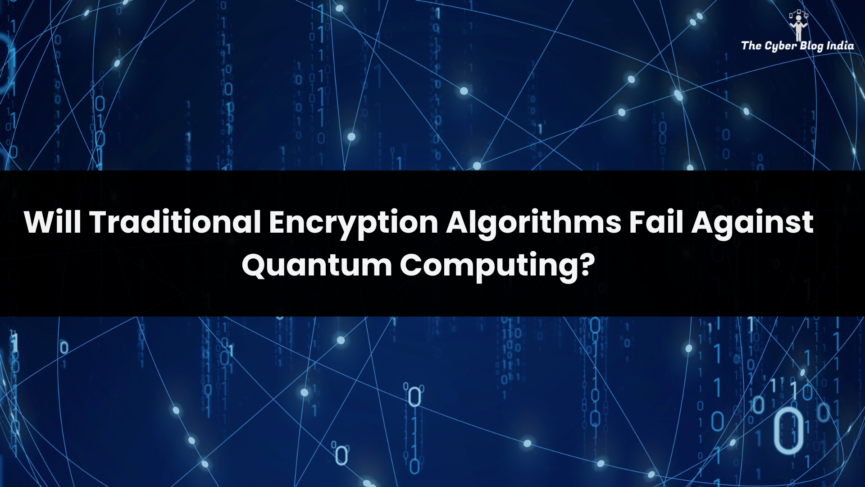Will Traditional Encryption Algorithms Fail Against Quantum Computing?

Do you know that most of our current security protocols run on the concept of computationally difficult to find? But what does that mean? In a specific security algorithm, the data undergoes a process of encryption. In this process, the plaintext and a key value through one or more series of function(s) result in a ciphertext. This ciphertext is virtually impossible to trace back to the original plaintext form by just glancing. For an attacker to get the unencrypted data, they must perform extensive computational tasks. This means that the process is difficult but not impossible.
At present, the security of our systems heavily relies on complexity. Certain attack mechanisms require a considerable amount of time to exploit. However, with the rise of quantum computers with exceptional computational capabilities, algorithms previously deemed secure through reverse engineering or brute force methods assumed to take hundreds or thousands of years can now be computed within seconds or minutes.
Quantum Computers
Quantum computers harness the power and unique properties of quantum mechanics, such as superposition and entanglement, to perform calculations far beyond traditional computers’ capabilities. This potentially revolutionises a wide range of security protocols and industries and sectors as a whole. These quantum computers can simulate the behaviour of complex materials at the atomic levels. In turn, this enables research and discovery of new materials and properties catered to certain specifications for various applications.
In data protection and cyber security, quantum computing offers transformative potential that can break traditional encryption. However, this should not feel like the end of the world. We can utilise the same technology to develop quantum-resistant encryption algorithms and secure communication channels.
Quantum computing enables advanced threat detection and mitigation techniques by analysing vast amounts of data with unparalleled speed and precision. This can enhance cyber security measures by detecting anomalies, identifying potential vulnerabilities, and proactively defending against cyber threats.
Shor’s Algorithm
Shor’s algorithm is a landmark achievement in quantum computing. It demonstrates quantum computing’s clear advantage over traditional algorithms. At its core, it is renowned for its ability to factor large numbers. This is a task that poses significant challenges for classical computers due to its computational complexity.
The algorithm operates by leveraging the principles of quantum mechanics, particularly quantum phase estimation and the inverse Quantum Fourier Transform (iQFT). Quantum phase estimation performs modular arithmetic to find the period of the number to be factored. This is a crucial step that underpins the factoring power of Shor’s Algorithm. After that, the iQFT transforms the quantum result of the modular arithmetic into classical information, making it usable for subsequent classical computations.
While Shor’s Algorithm offers exponential speedup compared to classical factoring algorithms, its implementation is far from simple. The algorithm comprises three major components: classical computation, quantum computation, and another round of classical computation. Within the quantum component are four subcomponents, each of which could warrant extensive explanation on its own. Notably, quantum phase estimation and iQFT are critical quantum subroutines that play a pivotal role in the algorithm’s functionality.
Post-Quantum Cryptography
Post-quantum cryptography leverages developed encryption methods that are resistant to attacks from classical and quantum computers. Some of the most commonly known approaches are lattice-based cryptography, code-based cryptography, and multivariate polynomial cryptography. These cryptographic processes can be very useful in solving computationally difficult mathematical problems. They will undoubtedly bring a paradigm shift in data security and encryption.
Quantum key distribution (QKD) implements a cryptographic protocol involving components of quantum mechanics to establish secure communication between two parties. The protocol allows for the distribution of cryptographic keys with a security guarantee by the laws of physics rather than traditional computational complexity. QKD prevents interception or eavesdropping on communication channels and is more secure than conventional algorithms. However, it is not immune to all attacks.
Quantum Computers to Beat the Internet
In a very interesting article by the Financial Times, they discuss the advent of quantum computing and its implications. Quantum computers hold both remarkable advancements and daunting challenges for cyber security. Dubbed “Q-day,” the moment when a powerful quantum computer can break the most common encryption methods, such as RSA, looms as a significant threat to online security. While the theoretical potential of quantum computing has been known since Peter Shor’s algorithm in 1994, practical implementation has been hindered by the instability of quantum systems. However, progress marches on, with efforts worldwide focused on developing robust quantum computers. These quantum machines cannot only break existing encryption but also secure communications in a quantum world. The race to harness its power intensifies as nations, corporations, and investors pour resources into quantum computing research. To grasp the implications of quantum computing, one must first understand its fundamental departure from classical computing principles.
Conclusion
As we stand on the precipice of the rise of quantum algorithms and the quantum computing revolution, we expect a seismic shift in cyber space and its security. Traditional algorithms, which once secured our data over decades, are almost on the verge of extinction. But amidst the uncertainty and anticipation, one question looms: Are we prepared for the quantum era? The stakes have never been higher with the race to develop quantum-resistant encryption algorithms and secure communication protocols in full swing. Will we adapt swiftly enough to safeguard our digital infrastructure from the Q-day?
